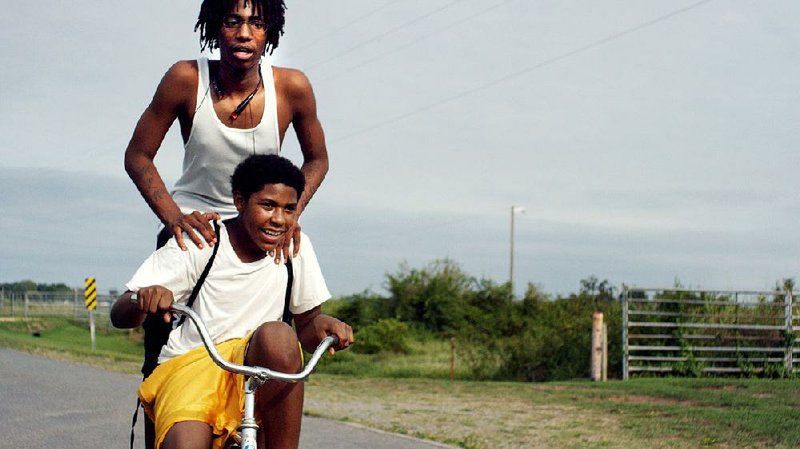Somewhere in the Arkansas woods, a pair of teen buddies, Dayveon (Devin Blackmon) and Brayden (Kordell Johnson), are hanging out and goofing off, riding their bikes, chucking stones in a pond, laughing and busting on each other in good-natured banter. It's a sweet scene, right up until they start practicing their gang signs back and forth.
Dayveon, whose older brother was killed in a gang, has just been beaten down as an indoctrination by his brother's old crew, and seems all too happy to join up with the same fractious bunch who ended up getting his brother murdered. Shortly after their acceptance, the pair of boys are in the back seat of a car owned by Mook (Lachion Buckingham), the de facto leader of the Bloods, as he and another man rob a liquor store, shooting the clerk in the process. As the business of their crimes starts ratcheting up, there's a sense that Dayveon and Brayden are about to get past the point of no return.
With an absent father and mother, lost in grief about her oldest son, Dayveon lives with his sister (Chasity Moore), and her boyfriend, Brian (Dontrell Bright), a good-natured, boisterous man, a friend of Dayveon's dead brother who deeply cares about the kid and wants to keep his mind straight. For his part, Dayveon wants nothing to do with Brian's attempts at moralizing, and doesn't want to open up to him. They hang out together, play video games, and watch TV, but Dayveon isn't interested in any kind of father figure. They are like brothers in a sense, but distant, with the unmistakable tang of tragedy hanging between them.
Dayveon is hovering on the precipice of catastrophe. Does he follow in his dead brother's footsteps and throw his life into the dust, or does he address his grief and break the cycle he's slowly locking himself into? What we are watching is the very moment in which he will have to make the decision that the rest of his life will hang upon. For a 13-year-old kid who still likes skipping stones, his entire world is at stake.
Sagely, Amman Abbasi (who wrote the screenplay along with Steven Reneau), making his feature debut, doesn't offer up any platitudes or easy answers. Shot in verite style, mostly with a hand-held camera, and delving deeply into the lives of the characters, Abbasi has no interest in moralizing or reducing the drama to a standard anti-crime polemic. Instead, he seems far more interested in suggesting the allure of a gang to a kid like Dayveon and the incredible difficulty of keeping on the straight and narrow.
Shot like a documentary, the film doesn't follow a three-act arc, which makes it feel all the more real. There isn't melodrama, or trumped up violence, even if the climax of the film has Dayveon finally being forced by Brian to directly confront his anger and grief; it's not a question of life or death, but rather a way to start making one's way out of the tunnel.
With a nonprofessional cast, many of whom were more or less playing variations of themselves, Abbasi shows an eye for visual detail and a strong sense of pace and rhythm. Scenes roll languidly, in no hurry to make dramatic hay, and then a sudden juxtaposition zings with clarity. Abbasi hasn't made a eulogy of the inner city: Though the small town is never clearly identified -- it is clearly in Arkansas -- the place is of tremendous importance to the film's texture. Time and again Abbasi incorporates the natural world in his frames, placing his characters within its confines and being dictated to by its rhythms.
This can work marvelously, as in the aforementioned woods scene, in which Abbasi temporarily drops his documentary style for something a good deal more prosaic, but it can also be overplayed: Much is made of a massive swarm of bees hanging on the branches of a tree just outside Dayveon's house, an overplayed bit of symbolism that is one of the film's few heavy missteps.
But it's clear Abbasi has a vision and the visual chops to make it work on-screen. This film, for all its strengths, is the first work of a young director still trying to gain mastery of his voice. That will come, and it will be fascinating to see what comes next.
MovieStyle on 01/27/2017
